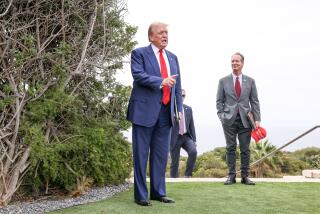Play Politics in Your Own Backyard
On an overcast fall evening, friends and neighbors gathered for wine and hors d’oeuvres at the homes of Chet and Jan Pipkin in Manhattan Beach and Len and Gordana Swanson in Rolling Hills Estates.
A casual visitor might have thought the guests were enjoying typical backyard parties, but these were parties with a purpose.
The Pipkins were introducing their guests to state Sen. Tim Leslie (R-Carnelian Bay) and encouraging them to contribute money to his campaign for election as California lieutenant governor.
At the Swansons’, the party had a similar purpose, but the beneficiary was state Assemblyman Brooks Firestone (R-Los Olivos), who at the time was running against Leslie for the Republican nomination but who has since switched races and is now running for Congress in the 22nd district, which covers Santa Barbara and San Luis Obispo counties.
It might seem surprising that both candidates held fund-raisers at voters’ homes on the same night, but it is becoming commonplace in California politics today.
Politicians at every level of state political office attend hundreds of events like these during every campaign season. And more and more ordinary folks are turning their backyards, usually used for casual fun and recreation, into temporary political arenas.
Backyard fund-raising has always been a part of California politicking, but it has gained more importance because of the passage in 1996 of Proposition 208, a ballot initiative that limits individual campaign contributions to $100 for local candidates, $250 for state legislative candidates and $500 for candidates for statewide offices.
“This is campaigning now,” Firestone said. “There won’t be any fancy dinners, because they come out of the limitations on the money we can spend,” he said. “People opening their homes is going to be much more the norm.
“First, it’s cheap. Second, it’s intimate. Third, a bunch of people who aren’t otherwise involved in politics [attend] because they are friends and neighbors.”
Added political consultant Tom Shepard of Campaign Strategies in San Diego:
“As a result of [Proposition] 208, a premium is placed on being able to bring together larger numbers of individual donors.”
Backyard parties typically bring in $5,000 to $7,000 for the candidate immediately before, during or soon after the event.
Most homeowners write checks to a candidate’s campaign for the maximum allowable amount, but a few feel that hosting the event is an adequate contribution.
Proposition 208 explains why politicians like backyard politicking, but why would homeowners open their houses, lean on friends and neighbors to attend, and spend their own time and money to put on the parties?
Chet Pipkin and Gordana Swanson both offered their homes to candidates they knew only slightly or not at all but who share their beliefs.
Pipkin met Leslie through the YMCA Model Legislature and Court, an educational program for high school students.
“I found there were enough areas where we agree on the philosophical-political side that I got very excited about supporting him,” Pipkin said. “It was his suggestion that we might consider hosting a function.”
Friendship can play a part too.
Attorney Martha Woliung held a fund-raiser at her home last year for Judge Karl W. Jaeger, whom she’s known since they worked on legal cases together more than 10 years ago.
Jaeger was sitting in a Municipal Court and campaigning for a seat on the Los Angeles County Superior Court.
“People in my community had an opportunity to get to know somebody who was going to be sitting on the Superior Court up close and personal.
“Other members of the judiciary attended, so people got a chance to interact and mingle with the judges, and I thought that was extremely beneficial,” Woliung said.
Community involvement has prompted Evelyn and Robert Gardner to open their Culver City home for numerous fund-raisers over the last several years, Evelyn Gardner said.
“[The parties aren’t] for people we know personally. [They’re] for people who we feel will make a contribution to our city, who share our ideological viewpoints.
“We’ve been living in this city for 50 years. We consider it a wonderful city, and we want to keep it that way,” she said.
Most recently, the Gardners’ backyard was the site of a party in support of Richard Marcus’ campaign (ultimately successful) for City Council.
Some time after the party, the City Council appointed Robert Gardner to Culver City’s Human Services Commission, a volunteer citizens’ board that meets monthly to discuss parks, auditoriums, seniors’ centers and the like.
Were the party and the appointment connected? Evelyn Gardner says no.
“We’ve been living here for 50 years and never ran for anything,” she said. “We’re just residents of the community.”
Besides offering their backyards, the homeowners generally provide the invitations, the decorations, the tables and chairs, the food and the beverages.
Some spend quite a bit of money for backyard gatherings. They offer catered appetizers and white wine to their guests. They display red, white and blue decorations and helium-filled balloons. They rent extra tables and chairs. The Pipkins said they spent nearly $500 on their event, and the Swansons and co-host Ted Bruinsma spent about $700 for their gathering.
Other hosts manage to keep the costs modest. Woliung says a lot of the food served at her party was donated by a six-person host committee that helped her with the invitations and follow-up phone calls. Evelyn Gardner also says much of the food for her events is donated.
As with any outdoor party, bad weather can be an unexpected problem for backyard political functions.
Gardener recalls what happened the day of the Marcus event.
“The tables looked beautiful. It was a sunny day. Then it started to rain,” she said.
“Everything had to be brought indoors and wiped off--all the tables and a hundred chairs. We moved the furniture in my house and set up tables in the garage. In the process, my carpets got filthy.”
Rain threatened the Pipkins’ event too.
“My wife was afraid everyone was going to get pushed inside. She moved into action to make sure the house was presentable,” Chet Pipkin recalls. “Then the weather turned, and it was absolutely perfect.”
A contingency plan for foul weather clearly is a good idea for anyone planning one of these events. Other suggestions for politically minded homeowners include asking neighbors to help with setup and cleanup; keeping tight control of the guest list, especially if there is a host committee; and ensuring that adequate refreshments will be on hand.
But the most important consideration is inviting enough people to ensure strong attendance. More people mean more money for the campaign.
“And the candidate doesn’t have to have umpteen coffee hours,” Gardner said.
More to Read
Get the L.A. Times Politics newsletter
Deeply reported insights into legislation, politics and policy from Sacramento, Washington and beyond. In your inbox three times per week.
You may occasionally receive promotional content from the Los Angeles Times.










